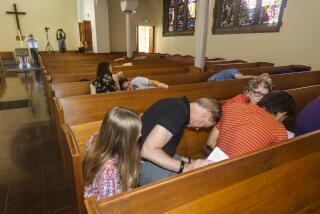COUNTYWIDE : Furnishing Churches for Disabled
- Share via
For hundreds of thousands of disabled Southern Californians, going to church is not as simple as darting across the parking lot, sliding into a pew and opening their ears and hearts to the word of God.
They need wheelchair ramps, handicapped parking spaces, sign-language interpreters or simple messages, depending on their disability.
“Many of the people who suffer from disabilities are unchurched because they feel it’s more trouble than it’s worth,” said Ginny Carr, 45, a Fullerton resident who contracted polio as a child and now wears a leg brace.
This weekend, she and her husband, Tom, 45, will lead one of 16 workshops at the first Southern California Conference on the Church and Disability in Fullerton.
One of the goals of the conference is to encourage churches to support families with disabled members by providing transportation, meals and services. Only about 10% of churches now offer special programs for the disabled, the Carrs said.
Topics at the conference will also include ministering to individuals disabled by AIDS, creating programs for the deaf, fostering enthusiasm in volunteers and reaching the physically and mentally disabled.
“The attitudes of the church are not what you would expect because the people are not accustomed to seeing disabled people,” said Tom Carr, who has been confined to a wheelchair since 1973 because of multiple sclerosis.
Preceding the conference will be a concert Friday at 7 p.m. at the Fullerton Evangelical Free Church, 2801 N. Brea Blvd., at which Joni EarecksonTada and Nancy Honeytree will perform. The conference itself will begin Saturday at 8 a.m. and participants can register at the door.
The most important things a church can provide are adequate access, parking spaces and bathroom facilities, Tom Carr said. He said the parking lot at Fullerton Evangelical Free Church now has about 30 handicapped spots, which were filled as soon as they were added.
“The more we add, the more people with physical challenges come because they know there will be a place to park. If somebody goes to a church and they have to walk a block, they’re probably not going to come back,” Ginny Carr said. “Having enough spots is a sign the church puts out for the disabled saying, ‘You are welcome here.’ ”
The Carrs, who have been married 10 years, and another couple, Regi and Monica Pope, will also conduct a seminar focusing on marriage and disability at the conference. Tom Carr said about 80% of marriages where at least one spouse suffers from a physical or emotional disability end in divorce.
“We have found ways to cope and we thought it would be wonderful if we could share the things that worked for us,” he said.
Another couple, Caroline and Robert Baker, chaplains of Rancho Los Amigos Medical Center in Downey, will speak about ministering in a rehabilitation setting. Caroline Baker said churches sometimes are overwhelmed because they feel they must meet all the needs of people with severe disabilities, so they end up doing nothing rather than something.
“We have a lot of gang members here who have been injured. They go home and have no church to back them up,” she said. “When we can find a church that is willing to help them with not just getting to church but with having someone help them get dressed to go to church, then that is exciting for us.”
Similar conferences have been held around the country, but none yet in Southern California, the sponsors said.
“We had a national conference in 1988 and found that people loved the idea of a national conference but thought it would be great to do something like this in their own area, custom-designed to their own needs,” said John Wern, conference director for Joni and Friends, an Agoura-based organization promoting Christian ministry in the disabled community.
Joni and Friends is sponsoring the conference, along with Crossroads Christian Church and Deaf Missions, both of Corona.
“The target audience is people who wish to minister to the disabled, not necessarily the disabled themselves,” Wern said. “It might be a family member; it might be a next-door neighbor, a Sunday school teacher or a professional.”
More to Read
Sign up for Essential California
The most important California stories and recommendations in your inbox every morning.
You may occasionally receive promotional content from the Los Angeles Times.













